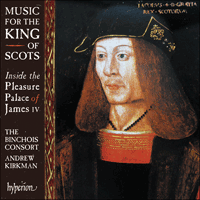Music for the King of Scots
View record and artist detailsRecord and Artist Details
Genre:
Vocal
Label: Hyperion
Magazine Review Date: 05/2021
Media Format: CD or Download
Media Runtime: 55
Mastering:
DDD
Catalogue Number: CDA68333

Tracks:
| Composition | Artist Credit |
|---|---|
| Horrendo subdenda rotarum machinamento |
Anonymous, Composer
Andrew Kirkman, Conductor Binchois Consort |
| Dilexisti iustitiam |
Anonymous, Composer
Andrew Kirkman, Conductor Binchois Consort |
| Horrendo subdenda rotarum machinamento 'Catherine Wheel Mass' |
Anonymous, Composer
Andrew Kirkman, Conductor Binchois Consort |
| Magnificat |
Anonymous - Reniassance, Composer
Andrew Kirkman, Conductor Binchois Consort |
| Ave Maria, mater Dei |
William Cornysh, Composer
Andrew Kirkman, Conductor Binchois Consort |
Author: Edward Breen
This latest release from The Binchois Consort represents early ‘musicking’ at its finest. The programme is built around music from the Carver Choirbook, thought to be associated with the seat of the Royal Chapel in Stirling and an important source of pre-Reformation music in Scotland. There is, however, another layer: this is a historically informed performance within a historic performance space – Linlithgow Palace – itself recreated in virtual reality. Musicology and music production triangulate James IV’s visits to Linlithgow Palace with the veneration of St Katherine and the Carver Choirbook in this very clever project. There’s even an accompanying app that enables you to listen with and without the VR chapel acoustic. What feels at first to be an intense claustrophobia quickly reveals itself to be the intimate, tapestried space of a private chapel where every detail of the singing is clear and close.
Missa Horrendo subdenda rotarum machinamento (c1460) would be much more famous were it securely attributed to a named composer. It’s a superb work and unjustly neglected until now. I really appreciate the way these singers navigate the juxtaposition of quicksilver duets with richer, full textures underpinned by the slower stability of a cantus firmus. Take the opening of the Gloria as an example of such enjoyable contrasts: the alto-tenor duet is full, rich and nimble, and there is an effortless segue into the fuller section. The sound is kept bright and perky by the silvery historic pronunciation. There is some really super singing here, particularly impressive considering it was recorded in an anechoic chamber before the VR chapel acoustic was applied.
The real showstopper on this programme is an anonymous Magnificat, whose verses alternate between joyfully rhythmic polyphony and a rich four-voice chant in the ‘fourth kind of faburdoun’. The immersive experience of this track in particular will stay with me for a long time.
Discover the world's largest classical music catalogue with Presto Music.

Gramophone Digital Club
- Digital Edition
- Digital Archive
- Reviews Database
- Full website access
From £8.75 / month
Subscribe
Gramophone Full Club
- Print Edition
- Digital Edition
- Digital Archive
- Reviews Database
- Full website access
From £11.00 / month
Subscribe
If you are a library, university or other organisation that would be interested in an institutional subscription to Gramophone please click here for further information.




